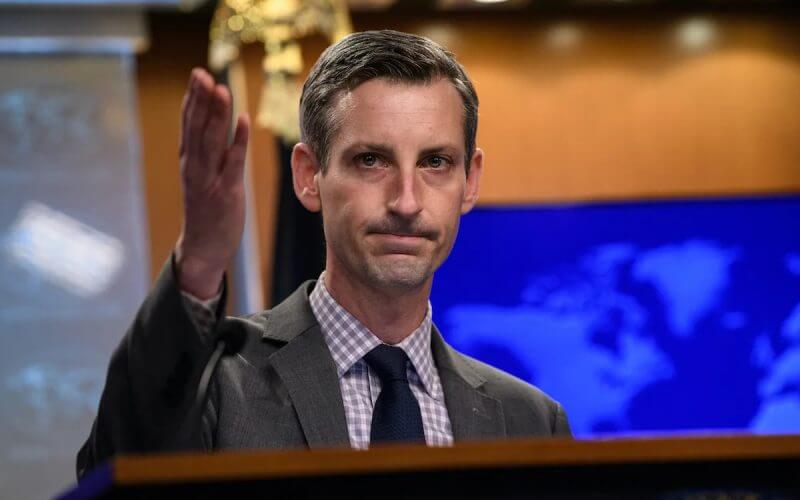Amidst ongoing bloody crackdowns by the Islamic Republic of Iran against protesters on the streets, State Department spokesperson Ned Price in a media briefing Thursday incorrectly characterized the Iranian demonstrators’ movement as one merely seeking “reforms” from the Islamic Republic, instead of calling it a quest for democracy or a revolution calling for the ouster of their government.
"We have spent a good deal of time at senior levels speaking about ways that we can demonstrate our support for those brave Iranians, including many women and girls, who are peacefully demonstrating, taking to the streets, to call for the reforms that they’re demanding," said Price.
The latest statement from the State Department comes as Iranian Americans throughout the U.S. call on the Biden administration to get tougher on the Islamic Republic and not engage in nuclear negotiations with regime officials.
The statement from Price caused a stir among many Iranian Americans online and inside Iran. Many Iranian American experts pointed out daily slogans on the streets of Iran as well as social media posts by supporters of the movement underscore a movement that is focused on overthrowing the Islamic Republic regime.
Experts note that perhaps the U.S. refuses to say that Iranian protesters are seeking the complete overthrow of the regime to curry favor with officials from Tehran for talks on a potential nuclear agreement.
Price's statement also comes as U.S. Iran envoy Robert Malley tweeted that Iranians were protesting to have the Islamic Republic "respect their human rights and dignity."
In response to his tweet, Iranians on social media strongly objected, saying ordinary people risking their lives in the streets had proven that they reject the clerical regime and want a new, democratic government and not just respect from an oppressive regime.
Following the outrage, Malley apologized, and the administration decided not to characterize the protest movement's demands.
However, many Iranian Americans still claim that the administration's refusal to name the Iranian people's demands for regime change is hypocritical, given that the President and his team have characterized other movements around the world as protests for democracy.
With negotiations between Tehran and the West in limbo, some believe that the administration is still interested in returning to the 2015 JCPOA nuclear agreement and is reluctant to antagonize the Iranian regime further.
After several months of negotiations in Vienna, Iran’s regime put forward demands in August that Washington rejected but did not declare an end to such talks.
Lawmakers in the House and Senate have called on the administration to replace Malley as Iran envoy and have called on the administration to do more to help the people of Iran.
An online petition organized by Iranian Americans launched in October has collected more than 127,000 signatures calling on the administration to fire Malley over his current and past comments. The sponsor for the petition said that the special envoy “minimized the Iran protest movement by portraying it as merely a quest by Iranians to have the government in Tehran respect their human rights and dignity."
Since the death of 22-year-old Mahsa Amini at the hands of the Islamic morality police over her incorrect hijab wear in September, Iranians have taken to the streets, calling for the downfall of the Islamic Republic. Iranians throughout Iran and elsewhere have called for the death of Iranian Supreme Leader Ali Khamenei and Iranian President Ebrahim Raisi.ii
In response to the ongoing protests, the regime has deployed the Islamic Revolutionary Guards Corps (IRGC), members of the Basij paramilitary forces, and has received support from their terrorist proxies in cracking down on protesters. The Iranian Supreme Leader has also publicly blamed the U.S. and Israel for allegedly inciting protests to overthrow the Islamic Republic.









